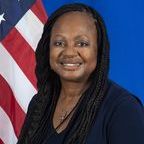



Amabassador Bonnie Jenkins
Under Secretary, Arms Control and International Security, US State Department
















Under Secretary, Arms Control and International Security, US State Department













Research and Policy Associate, Institute for Strategic Dialogue
Sara Bundtzen is a Research and Policy Associate at the Institute for Strategic Dialogue (ISD), where she analyses online disinformation and propaganda, and advises on platform regulation. Sara is also a member of the Young Deep Cuts Commission (YDCC).
Sara previously worked at the Ministry of Defence in Berlin and NATO HQ. She gained experience at the Delegation of the EU to the US and the International Crisis Group. Sara holds an MA in International Security with a concentration in Intelligence Studies from Sciences Po Paris and a BSc in European Studies from the University of Southern Denmark.

Safety Assessment Specialist, AWE
Ben graduated from the University of Southampton with an MChem in Chemistry. He joined AWE as part of their Nuclear Safety graduate scheme in 2020. During his time at AWE Ben has been involved in the Broad Perspectives on Nuclear Issues group, which is a forum for AWE Staff to better understand Nuclear issues and Nuclear politics around the world.
Research Assistant, King's College London
Zuzanna is a Research Assistant at the Centre for Science and Security Studies (CSSS). She holds a BA in Philosophy, Politics and Economics from Durham University and an MA in Arms Control and International Security at King’s College London.
Her research interests include issues related to arms control and emerging technologies, China’s defence and security policy, and North Korea’s sanctions evasion and proliferation tactics. She speaks English and Polish and is learning Russian and Mandarin.

Under Secretary, Arms Control and International Security, US State Department
Ambassador Bonnie Denise Jenkins, PhD has served as the Under Secretary for Arms Control and International Security since July 22, 2021. She previously served in the Obama Administration as Special Envoy and Coordinator for Threat Reduction Programs in the Bureau of International Security and Nonproliferation (ISN) from July 2009 until January 2017. Ambassador Jenkins coordinated U.S. efforts on threat reduction globally and U.S. government programs in chemical, biological, nuclear, and radiological (CBRN) security. She was the State Department lead for all four of the Nuclear Security Summits held from 2010 to 2016, as well as the U.S. Representative to the G7 Global Partnership Against the Spread of Weapons and Materials of Mass Destruction. Before serving as Coordinator, she was a Legal Adviser to the U.S. Arms Control and Disarmament Agency where she provided advice to U.S. ambassadors and delegations negotiating arms control and nonproliferation treaties. Ambassador Jenkins also provided legal advice to treaty implementation bodies including the Chemical Weapons Convention, the Comprehensive Nuclear Test Ban Treaty, the Open Skies Treaty, the Conventional Forces in Europe Treaty, and the Biological Weapons Convention (BWC). She has worked with international institutions such as the International Atomic Energy Agency, the World Health Organization, the Organization for the Prohibition of Chemical Weapons, the Office of Security and Cooperation in Europe, the Comprehensive Nuclear-Test-Ban Treaty Organization, Interpol, and the BWC Implementation Support Unit.
From 2014 to 2017, Ambassador Jenkins led diplomatic efforts to promote the Global Health Security Agenda, a group of 70 countries, international organizations, non-government organizations, and private sector companies that builds countries’ capacity to prevent, detect, and respond to infectious disease threats like Ebola and Zika. She also dedicated significant attention to the engagement with Africa to counter CBRN threats. In partnership with the U.S. Defense Threat Reduction Agency and U.S. Africa Command she developed the Threat Reduction in Africa program to help ensure that U.S. programs and activities in CBRN security were well coordinated and met the needs of African partners.
For her service as Coordinator of Threat Reduction Programs, Ambassador Jenkins was the 2016 ISN Nominee for the Secretary’s Award for Excellence in International Security Affairs. Prior to re-joining the government in 2009, Jenkins worked at the Ford Foundation as the Program Officer for US Foreign and Security Policy, and Conflicts. She also served as Counsel on the National Commission on Terrorist Attacks Upon the United States (9/11 Commission). She was the lead staff member conducting research, interviews, and preparing commission reports on counterterrorism policies in the Office of the Secretary of Defense and on U.S. military plans targeting al Qaeda before 9/11. Ambassador Jenkins served as General Counsel to the U.S. Commission to Assess the Organization of the Federal Government to Combat the Proliferation of Weapons of Mass Destruction and worked at Rand Corporation focusing on Middle East weapons of mass destruction issues.
From its inception in 2017 until April 2021, Ambassador Jenkins was the Founder, Executive Director, and Board Chair of Women of Color Advancing Peace and Security (WCAPS), a leading advocacy organization supporting women of color in the security and peace-building sector that believes global issues are best approached from a variety of perspectives. In June 2020, she also founded Organizations in Solidarity, which supports a common vision of a world where all people are treated equally, fairly, and with respect.
Ambassador Jenkins has been an adjunct professor at Georgetown University Law School, Georgetown University School of Foreign Service and George Washington Elliott School of International Affairs. She also assisted in designing and leading arms control and nonproliferation simulation courses at Stanford University and in designing a global health simulation at the University of Pennsylvania and Spelman College.
From 2017 to 2020, Ambassador Jenkins was a Nonresident Senior Fellow at Brookings Institution. In 2017 she was a Senior Fellow at the Perry World House at the University of Pennsylvania. She was a pre-doctoral fellow at the Belfer Center for Science and International Affairs at the John F. Kennedy School of Government, Harvard University. During her years at the Belfer Center she worked at Harvard Law School in the Bernard Koteen Office of Public Interest Advising as an advisor to law students on legal jobs in the public sector. Ambassador Jenkins has a Ph.D. in International Relations from the University of Virginia; an LL.M. in International and Comparative Law from the Georgetown University Law Center; an M.P.A. from the State University of New York at Albany; a J.D. from Albany Law School; and a B.A. from Amherst College. She also attended The Hague Academy for International Law. Jenkins is a retired U.S. Naval Reserve Officer and received numerous awards for her military service. She is a member of the New York State Bar.

Director, Defence and International Security, FCDO
Samantha Job became the Director for Defence and International Security at the Foreign, Commonwealth & Development Office (FCDO) in March 2019. Samantha has been a career foreign service officer since 1992. She has worked on geographical issues from South East Asia to the Middle East and thematic issues from war crimes to how to use social media in foreign policy. A theme of her career has been security policy, where she has led policy formulation on counter-proliferation, EU Security and Defence Policy and counter terrorism.
Her work has taken her to Thailand and the UK’s Mission to the UN in New York, where she was the counter terrorism and counter proliferation specialist. From 2013 to 2015, Samantha was the joint Head of the North Africa Department in the FCDO in London. From 2016 to early 2019, Samantha was the Foreign and Security Policy Counsellor at the British Embassy, Washington, engaging with the US government across all aspects of national security policy. Samantha is a strong supporter of diversity and inclusion, and is the National Security Council’s (NSC) gender champion.

Graduate Engineer, AWE
Alex is a graduate engineer at the Atomic Weapons Establishment (AWE). He graduated from the University of Sheffield in 2019 with an integrated master’s degree in chemical engineering. Whilst taking a module in nuclear engineering he came across nuclear fuel cycles and has subsequently developed an interest in the technologies being developed to support a closed fuel cycle.
Now coming to the end of the AWE graduate programme, Alex has built experience by rotating round multiple different departments within the company. This was how he learnt about the concept of a circular economy working with the environment department.

Student, University of Edinburgh
Seungcheol is a recent graduate of the University of Edinburgh with an MA in International Relations, where he developed an interest in nuclear security analysis in Northeast Asia. He has been involved with numerous interesting projects, taking part in a humanitarian development project in the Philippines and suggesting an ASEAN-Korea cooperation plan in health and hygiene security for the South Korean government’s New Southern Policy.
His research interests centre on nuclear non-proliferation and strategic stability in Northeast Asia. He will pursue a master's in international affairs with a concentration in international security policy at Columbia University this fall.

Consultant, PA Consulting
Robbie Lyons is an Economics and Investment Strategy Consultant at PA Consulting, focussed on helping clients in the defence and nuclear sectors to make optimal investment decisions. Robbie has a PhD in Engineering from the University of Cambridge for his research into the effect of supply chain configuration on small modular reactor economics.
Robbie previously worked at BAE Systems Submarines as a nuclear engineering graduate, where he gained experience across multiple departments relating to nuclear technology and safety. Robbie has a bachelor’s degree in Physics from Cornell University, and a master’s degree in Nuclear Engineering from Imperial College London.

Safety Assessment Specialist, AWE
Lacey-Jo graduated with a Master's degree in Biological Sciences (Biochemistry) from the University of Leicester in 2020 and has been on the Safety Assessment Graduate Scheme at AWE since September 2020.
During her time at AWE, she has been involved in various Equity, Diversity and Inclusion groups and is now one of the co-chairs of AWEPride. She is also an active member of the Young Nuclear Professionals Forum (YNPF) and the Nuclear Institute Young Generation Network (YGN).

Research Fellow, German Council of Foreign Relations
Dr Aylin Matlé is a research fellow at the German Council on Foreign Relation’s Security and Defense Program. Previously, she was deputy head of Konrad-Adenauer-Stiftung’s Israel office in Jerusalem and was a research associate for the chair of International Relations and European Politics at the Martin-Luther-Universität Halle-Wittenberg (MLU).
Aylin studied political science at Zeppelin University and War Studies at King’s College London. Her PhD from MLU analysed the impact of US engagement on NATO and defence policies of European allies during Barack Obama’s presidency. Aylin’s research focuses on transatlantic security and defence, especially NATO and Germany’s security and defence policies.

Senior Business Analyst, UK Ministry of Defence
Rhia a Senior Business Analyst and has been working in the Defence Industry for a year and a half. Her current role has her working on various projects, capturing user and system requirements, analysing “as is” and “to be” solutions, driving best practice while adhering to security constraints, and reviewing a mixture of People, Organisation, Processes, Information, and Technology.
Prior to Defence, Rhia worked in the Financial Industry for 3 years, for Data Interconnect, and the Technology Industry for 4 years, working for Dyson.

Graduate Physicist, AWE
Lucy Millington graduated from The University of Birmingham with an Integrated Master’s degree in Physics, specialising in Nuclear Physics. She then joined the graduate scheme at the Atomic Weapons Establishment (AWE) as an Applied Scientist.
Lucy has worked in multiple different teams within physics throughout the scheme and is now working as a Technical Advisor to an Executive Director. Whilst researching nuclear treaties and policies she gained an interest in the Iran Nuclear Deal, leading to her UK PONI research topic focusing on the JCPOA.

Student, King's College London
Liv is currently completing an MA with the War Studies department at King's College London in Science and International Security. She is a recent graduate from the University of Bristol with an BA Hons degree in French and Politics.
Scientist, UK Ministry of Defence
Joshua is a scientist for the Ministry of Defence. He has worked in the defence nuclear sector for five and a half years, having joined the MOD’s engineering and science graduate scheme in November 2016. His current role encompasses performing statistical and analytical modelling to support technical planning and policy.
Operations and Technical Support Assistant, NNL
Kate Taylor is a solvent extraction modeller in the chemical and process modelling team at the National Nuclear Laboratory. She joined NNL in 2017 after earning a Masters degree in Physics from the University of Leeds.
Her work involves modelling the chemical processes that make reprocessing and recycling possible, and she has worked on the advanced PUREX (Plutonium Uranium Reduction EXtraction) and iSANEX (innovative Selective ActiNide EXtraction) processes. She has also recently begun work exploring the separation of lanthanides for medical applications.

Affiliate, Oslo Nuclear Project, University of Oslo
Jamie is a graduate affiliate and research assistant with the Oslo Nuclear Project at the University of Oslo, where she is pursuing her MPhil in Peace and Conflict Studies. Her work focuses on nonproliferation, verification, and open-source analysis. She is also an International Atomic Energy Agency Marie Sklodowska-Curie fellow and an intern with the Stockholm International Peace Research Institute in the Dual Use and Arms Trade program, where she focuses on the Missile Technology Control Regime.
Jamie was previously a Research Assistant at the James Martin Center for Nonproliferation Studies. She received her BA in Political Science from Columbia University.